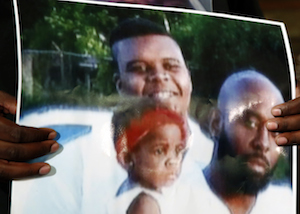Democrats invoke death in Ferguson to mobilize black vote
Sunday, August 31, 2014
WASHINGTON -- With their Senate majority imperiled, Democrats are trying to mobilize black voters angered by the shooting in Ferguson, Mo., to help them retain control of at least one chamber of Congress for President Barack Obama's final two years in office.
In black churches and on black talk radio, civic leaders have begun to invoke the death of Michael Brown in Ferguson, along with conservative calls to impeach Obama, as they urge black voters to channel their anger by voting Democratic in the midterm elections, in which minority-group turnout is typically lower.
"Ferguson has made it crystal clear to the African-American community and others that we've got to go to the polls," said Rep. John Lewis, D-Ga., a civil-rights leader. "You participate and vote, and you can have some control over what happens to your child and your country."
The push is an attempt to counter Republicans' many advantages in this year's races, including polls that show Republican voters are much more engaged in the elections at this point -- an important predictor of turnout.
Lewis is headlining efforts to mobilize black voters in several states with competitive Senate races, including Arkansas, Louisiana and North Carolina. The drive is being organized by the Congressional Black Caucus, in coordination with the Democratic Senatorial Campaign Committee. Other steps, such as recruiting NBA players to help register more black voters, are also underway.
While Democrats always seek to increase minority-group turnout, that they are taking such aggressive steps to rally their most loyal constituency reflects the increasingly difficult landscape they face. In recent weeks, seats in Colorado, Iowa and New Hampshire, once expected to tilt toward the Democrats, have become more competitive.
Obama's approval rating has tumbled below 40 percent in states with some of the most competitive races, and Republicans already seem assured of winning at least three of the six seats they need to take control of the Senate.
And the terrain is tricky: Many of the states where the black vote could be most crucial are also those where Obama is deeply unpopular among many white voters. So Democratic senators in places like Arkansas, Louisiana and North Carolina must distance themselves from the nation's first black president while trying to motivate the black voters who are his most loyal constituents.
Labor Day is the unofficial kickoff for the general election campaign, and analysts say the contest for control of the Senate remains unsettled, though most give a slight edge to the Republicans. After a turbulent summer dominated more by a succession of grim news events at home and abroad than by typical election-year appeals, officials in both parties agree that the campaign is fluid and that a wave election, with one party winning a large number of seats, is unlikely to happen.
The black vote could prove particularly decisive in four Southern states: Georgia and Louisiana, where black people make up more than 30 percent of eligible voters; North Carolina, where they are 22 percent; and Arkansas, 15 percent.
While minority-group turnout traditionally declines in nonpresidential election years, there have been midterm elections in which Southern blacks played a pivotal role. An example occurred in 1998, when President Bill Clinton was, like Obama, under fire from Republicans and nearing the end of his White House years.
And polls show that blacks are three times as likely to say the shooting of Brown, an unarmed, black 18-year-old, by a white Ferguson police officer was not justified.
With this in mind, leading black officials are moving to seize the aftermath of the shooting and subsequent protests to increase black voters' political participation.
"If there was as much marching at high noon on Election Day, we would not have to march at midnight," said Rep. James Clyburn of South Carolina, the third-ranking House Democrat, alluding to the late-night protests in Ferguson.
Information for this article was contributed by Abby Goodnough of The New York Times.
A Section on 08/31/2014
